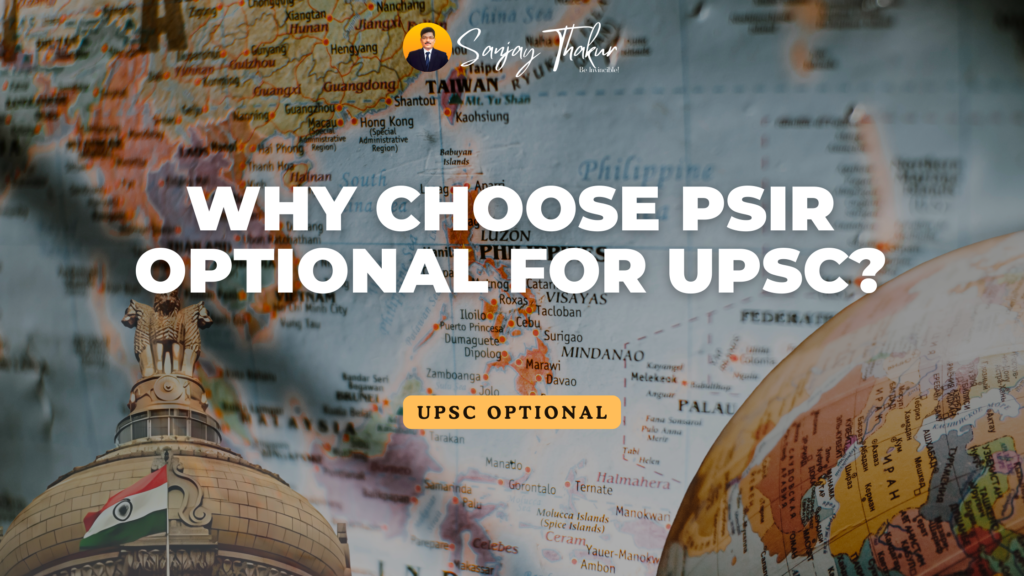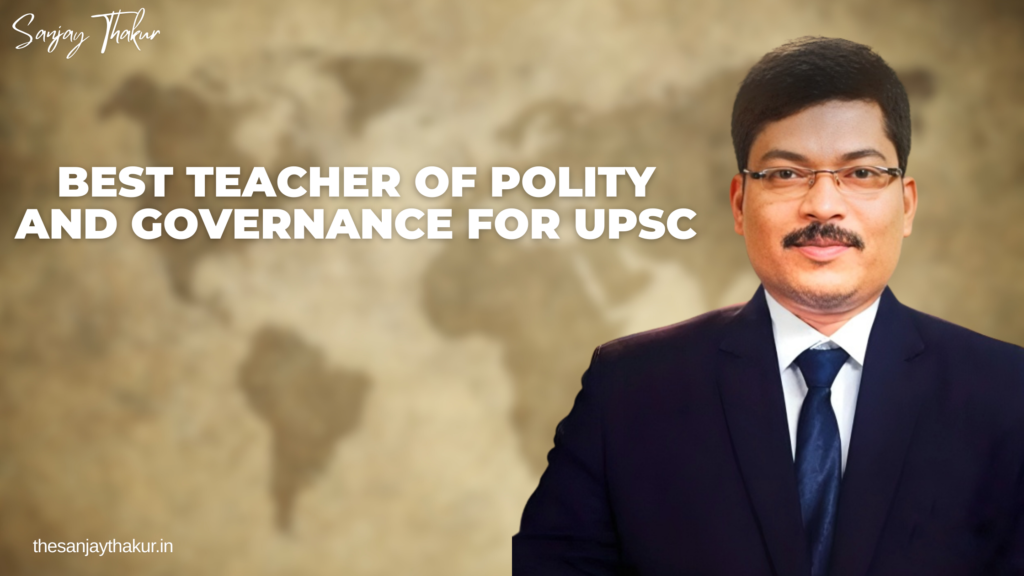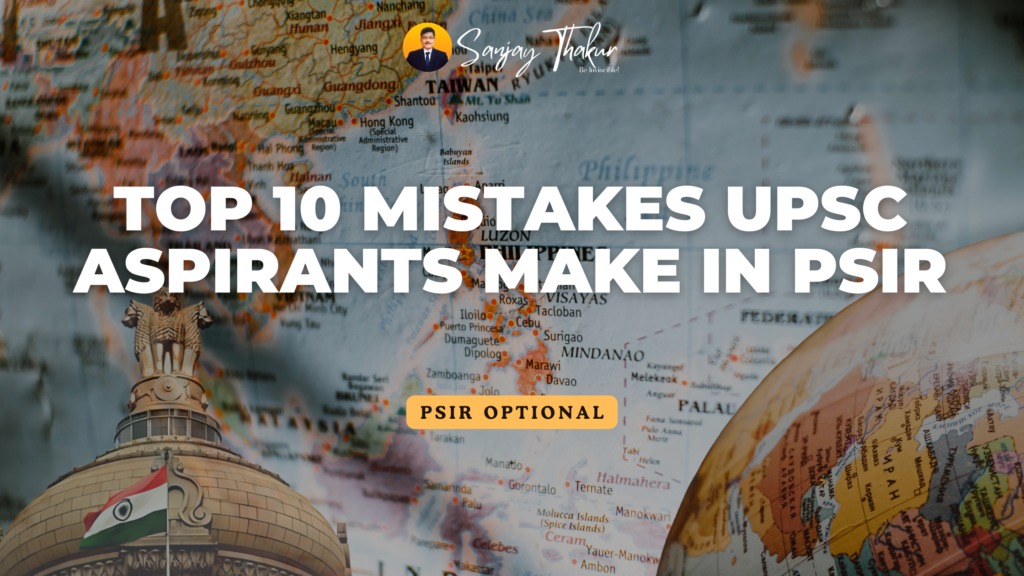इस लेख को हिन्दी से पढ़ने के लिए Top- Right Corner में language button में क्लिक करके हिन्दी का चयन करें।

The choice of an optional subject is a pivotal decision in the UPSC Civil Services Examination. Among the diverse range of optional subjects, Political Science and International Relations (PSIR) stands out as one of the most popular and rewarding choices. If you’re wondering why PSIR is a top pick for many toppers and aspirants, this guide will walk you through its benefits, scoring potential, and its alignment with the UPSC syllabus.
Let’s explore why PSIR could be the perfect optional for your journey and how the Sanjay Thakur Sir PSIR Course can help you master it.
What is PSIR Optional?
Political Science and International Relations (PSIR) is an optional subject that delves into the theoretical and practical aspects of politics, governance, and global affairs. It’s divided into two papers:
- Paper 1: Political Theory and Indian Government & Politics.
- Paper 2: Comparative Politics and International Relations.
PSIR combines philosophy, history, and current affairs, offering a comprehensive perspective that’s valuable for UPSC aspirants.
Benefits of Choosing PSIR Optional
1. High Scoring Potential
- Structured Syllabus: PSIR has a well-defined and concise syllabus, making it easier to prepare compared to some other optionals.
- Application of Current Affairs: The subject allows you to incorporate recent developments into your answers, making them dynamic and relevant.
- Consistency in Results: Over the years, PSIR has consistently helped aspirants achieve high scores, with many toppers opting for it.
2. Overlap with General Studies (GS) Papers
One of the biggest advantages of PSIR is its significant overlap with the GS syllabus, which saves time and effort:
- GS Paper 2 (Polity, Governance, IR): Topics like Indian Constitution, federalism, governance, and international relations are directly covered.
- GS Paper 4 (Ethics): Political philosophies and ethical theories overlap with concepts in PSIR.
- Essay Paper: PSIR enhances your ability to write structured and analytical essays, especially on political or global topics.
3. Relevance to Current Affairs
- Dynamic Subject: Topics in PSIR, especially International Relations (IR), are deeply connected to current events like global geopolitics, climate diplomacy, and India’s foreign policy.
- Prelims Advantage: Understanding constitutional provisions and governance issues in PSIR can boost your Polity preparation for Prelims.
4. Develops Analytical Thinking
PSIR sharpens your critical thinking and ability to connect theoretical frameworks with practical scenarios, a skill essential for both Mains and the Interview stage.
Is PSIR the Right Optional for You?
PSIR might be the ideal choice if:
- You have an interest in politics, governance, or international relations.
- You enjoy analyzing current events and connecting them to larger frameworks.
- You are looking for an optional with a well-structured syllabus and overlap with GS papers.
How to Excel in PSIR Optional
- Master the Basics: Start with foundational concepts like political ideologies (liberalism, Marxism) and Indian Constitution.
- Integrate Current Affairs: Relate topics like global governance and India’s foreign policy to recent developments.
- Answer Writing Practice: Focus on writing analytical and structured answers with balanced arguments.
- Choose the Right Mentor: Guidance from an expert can simplify concepts and streamline your preparation.
Why Join the Sanjay Thakur PSIR Course?
Sanjay Thakur Sir, a renowned name in UPSC preparation, is widely regarded as one of the best PSIR mentors in India. His expertise, combined with a student-centric approach, makes his PSIR course a game-changer for aspirants.
Course Features
- Comprehensive Syllabus Coverage
- Detailed lectures on thinkers, ideologies, governance, and international relations.
- Simplified explanations of complex topics like Plato, Rawls, and comparative politics.
- Current Affairs Integration
- Regular updates on international events and their relevance to PSIR.
- Insights into India’s evolving foreign policy and geopolitical challenges.
- Answer-Writing Mastery
- Techniques to write impactful introductions, balanced arguments, and strong conclusions.
- Model answers and feedback for continuous improvement.
- Interactive Learning
- Live classes with doubt-clearing sessions.
- Access to recorded lectures for flexible learning.
- Study Material and Notes
- Concise, exam-oriented notes covering the entire syllabus.
- Supplementary material for recent developments in IR.
- Mock Tests and Evaluations
- Regular tests to track progress and improve writing skills.
- Detailed evaluations with actionable feedback.
Success Stories
Many of Sanjay Thakur Sir’s students have excelled in PSIR optional, achieving 300+ marks and securing top ranks in UPSC. His unique approach to teaching ensures aspirants gain both conceptual clarity and practical exam strategies.
Frequently Asked Questions (FAQs)
Q: Is PSIR suitable for beginners?
A: Yes, PSIR is beginner-friendly, especially with proper guidance. It offers a logical progression from basic concepts to advanced topics.
Q: How much time does PSIR preparation require?
A: With dedicated study and expert guidance, PSIR can be prepared in 6-7 months.
Q: Does PSIR require prior knowledge of Political Science?
A: No prior background is needed. Sanjay Sir’s course starts with the basics, making it accessible to all aspirants.
Choosing PSIR optional can be a turning point in your UPSC preparation, thanks to its scoring potential, relevance, and overlap with GS papers. With the right mentor, such as Sanjay Thakur Sir, mastering PSIR becomes a streamlined and rewarding experience.
Ready to ace PSIR?
Enroll in Sanjay Thakur’s PSIR Course today and take the first step towards your UPSC success!


